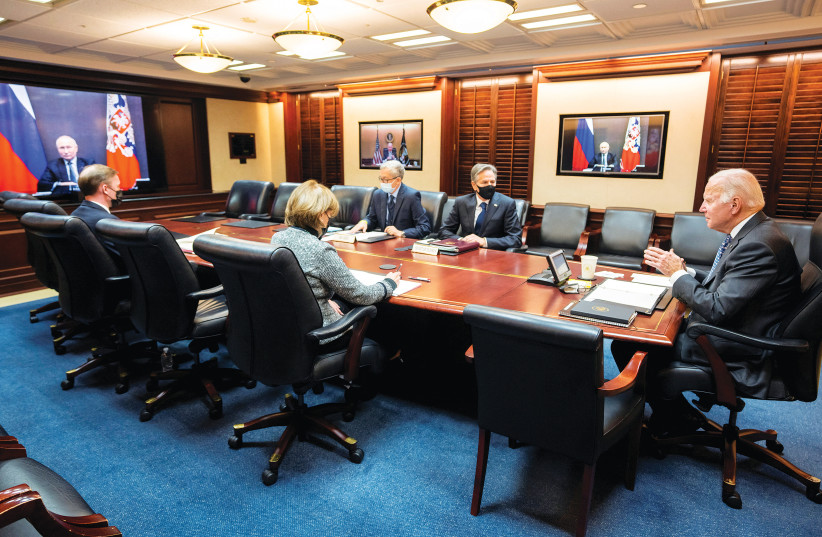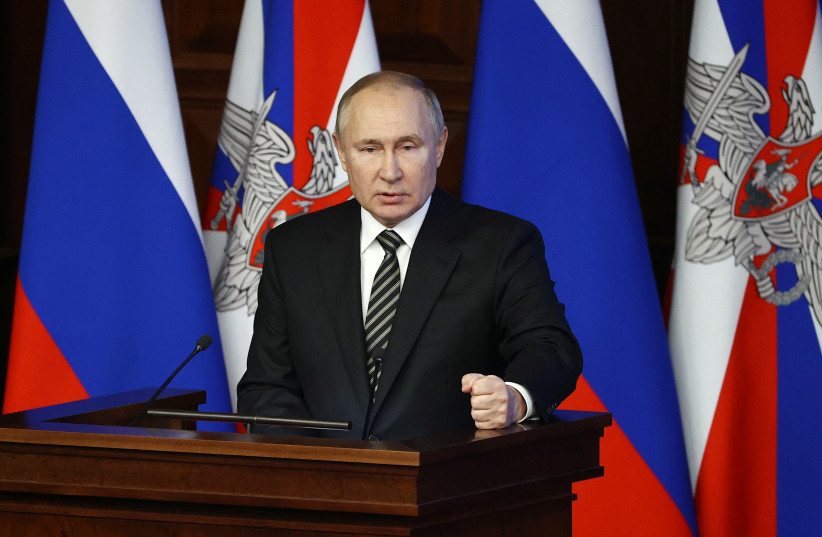DIPLOMATIC AFFAIRS: Israel is attempting to walk a fine line between the saber-rattling of the US and Russia over the Ukraine situation.
OMRI NAHMIASPublished: JANUARY 13, 2022 23:00

WASHINGTON – In the past few weeks, the US has been ringing the alarm bells, warning of a possible Russian invasion of Ukraine.
Since the end of November, Secretary of State Antony Blinken has spoken to at least 14 foreign ministers, from Canada, Brazil, EU countries, Japan, Georgia, Kazakhstan and elsewhere. One line that repeated itself in several of the State Department readouts of the different calls was “a need for a strong, united response against further Russian aggression against Ukraine.”
The gulf between Russia’s position and that of the United States and its allies appeared as stark as ever after four hours of talks in Brussels, the second attempt this week to defuse a crisis provoked by the massing of Russian troops near Ukraine. Senior Biden administration officials said on Wednesday that the US has largely settled on the options for sanctions against Russia should it invade Ukraine, and will be prepared to impose them as soon as any tanks roll.
cnxps.cmd.push(function () { cnxps({ playerId: ’36af7c51-0caf-4741-9824-2c941fc6c17b’ }).render(‘4c4d856e0e6f4e3d808bbc1715e132f6’); });
Last week, Blinken called Foreign Minister Yair Lapid to discuss, among other issues, the situation between Russia and Ukraine.
“The secretary and foreign minister discussed a range of regional and global challenges, including the risks of further Russian aggression against Ukraine, as well as the challenges posed by Iran,” the State Department said in a statement.

AS MUCH as the US wants to see its close ally taking a tough position on Russia, Israel has its own considerations. It also needs to maintain its unique relationship with Russia, including coordination in Syria, explains Dan Arbell, scholar-in-residence at the Center for Israeli Studies at American University. Arbell previously served as deputy chief of mission at the Israel Embassy in Washington, and has been a diplomat for over 20 years.
“Israel cannot ignore the increasing Russian involvement in the Middle East, its presence in Syria, and its global influence, he says. “On top of that, the countries have vibrant trade relations.
“For these reasons, it is essential for Israel to maintain open lines of communication with Moscow, and to avoid a rift with the Kremlin – even more so, when taking into account the different positions that the countries hold on Iran, its regional proxies and the JCPOA, and Jerusalem’s desire to have [Russian President Vladimir] Putin’s ear on these issues,” Arbell says.
He noted that, historically, the US understood Israel’s need to maintain a positive relationship with Russia.
“However, it is also clear to the administration that the US-Israel relationship is top priority for Jerusalem,” he says. “The Biden administration wanted to see Israel adopt a more critical tone towards Russia, but I don’t believe that Blinken really expects that Israel would do so.
“The US would like to see, perhaps, some moral support, maybe an expression of concern and support for Ukraine’s sovereignty and territorial integrity; but I don’t see Israel – or the Gulf countries – threatening Russia with sanctions,” he continues. “Each of the Middle East countries has complex relations with Russia, and will not want to jeopardize them, especially as Russia has not invaded Ukraine.”
“The key to Israel’s operational freedom in targeting Iranian assets in Syria has been its ability to deconflict with Russia, which maintains sophisticated air defense assets in Syria that could present significant challenges to Israeli planes,” explains Jonathan Schanzer, senior vice president at the Foundation for Defense of Democracies in Washington.
“Until now, Israel has not had an adversarial relationship with Russia, nor has it had a warm alliance,” Schanzer continues. “The ties have been professional and carefully coordinated to ensure continued freedom of action. Israel will want to avoid any developments that could curtail that freedom of action. Washington knows this.”
“Hopefully, the two long-standing allies can reach a modus vivendi that enables Israel to continue to counter Iranian malign activity in the region, particularly at a time when Iran may receive a financial windfall,” he says. “Should there be a return to the deeply flawed 2015 nuclear deal, Iran will receive massive sanctions relief that will enable a significant uptick in support to Iran-backed terror groups and allied regimes that threaten Israel.”
Elliott Abrams, senior fellow for Middle Eastern studies at the Council on Foreign Relations and former US deputy national security advisor, said that in Syria, Israel has been working effectively with the Russians.
“There is no reason that cannot continue regardless of events in Ukraine,” he says.
“It’s true that friction between China and the US, and now Russia and the US, can create difficulties for Israel,” Abrams says. “But Israelis should remember who is their friend and ally, defender in the United Nations system, and provider of many key weapons – and it isn’t China or Russia. The United States will not expect Israel to be loudly critical of Russia, but every country should oppose clear aggression across national boundaries. There are principles at stake here that in the end benefit and protect Israel, too.”
Dennis Ross, distinguished fellow at the Washington Institute for Near East Policy, says that Israel is actually caught in the middle between the US and China much more than between the US and Russia.
“The economic, especially hi-tech competition with China puts Israel in a complicated position when the Chinese seek to invest in Israeli technologies,” he says.
“As for Russia, there is an irony: we don’t have a problem with what Israel does in Syria, even as the Russians from time to time have had such a problem, and Israel has to take that into account,” he says. “Having Israel condemn the Russians publicly over Ukraine is not going to happen, but is it really something necessary from an American standpoint? Not really.
“That said, Blinken’s outreach to Arab states on Ukraine is both to indicate that we will not give in to Putin’s coercion, as a way of showing American steadfastness, and to probe the reactions of these states to what the Russians are doing,” Ross continues. “In the best case – not a particularly likely one – he may be probing to see whether any leaders are prepared to join some very general statements about the inviolability of borders.
“On Israel, there is another irony,” Ross analyzes. “The US could actually use Israel’s readiness to use force if it appears that diplomacy cannot prevent Iran from becoming a nuclear weapons state or one that is a turnkey away from becoming one.
“The more it is clear that Israel won’t live with such an outcome, the more it should create an incentive for the Russians and the Chinese to apply pressure on Iran lest there be a broader regional war.
“After all, if Israel hits Iran, it will be struck by missiles from Hezbollah out of Lebanon and Shia militias from Iraq. The Russians are in Syria and don’t want to get caught in the middle of such a conflict. And China, as the world’s largest importer of oil, does not want a major disruption caused by war in the Middle East.
“So smart US diplomacy would know that Israeli threats may actually help produce a diplomatic outcome, especially if it is clear that we will feel bound to support the Israelis,” says Ross.
Content retrieved from: https://www.jpost.com/international/article-692504.